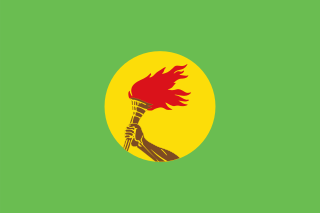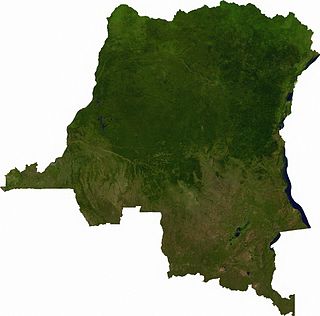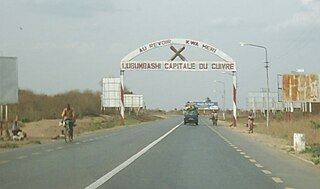
Politics of the Democratic Republic of Congo take place in the framework of a republic in transition from a civil war to a semi-presidential republic.

Zaire, officially the Republic of Zaire, was the name of the Democratic Republic of the Congo from 1971 to May 18, 1997. Located in Central Africa, it was, by area, the third-largest country in Africa after Sudan and Algeria, and the 11th-largest country in the world from 1965 to 1997. With a population of over 23 million, Zaire was the most populous Francophone country in Africa. Zaire played a central role during the Cold War.

Mobutu Sese Seko Kuku Ngbendu wa za Banga, often shortened to Mobutu Sese Seko or Mobutu and also known by his initials MSS, was a Congolese politician and military officer who was the 1st and only President of Zaire from 1971 to 1997. Previously, Mobutu served as the 2nd President of the Democratic Republic of the Congo from 1965 to 1971. He also served as the 5th Chairman of the Organisation of African Unity from 1967 to 1968. During the Congo Crisis, Mobutu, serving as Chief of Staff of the Army and supported by Belgium and the United States, deposed the democratically elected government of left-wing nationalist Patrice Lumumba in 1960. Mobutu installed a government that arranged for Lumumba's execution in 1961, and continued to lead the country's armed forces until he took power directly in a second coup in 1965.

Léon Kengo wa Dondo is a Congolese politician who served as the "first state commissioner" several times under Mobutu Sese Seko in Zaïre. He was one of the most powerful figures in the regime and was a strong advocate of economic globalization and free-market economics. He served as President of the Senate of the Democratic Republic of the Congo from 2007 to 2019.

The Alliance of Democratic Forces for the Liberation of Congo-Zaire, also known by the French acronym AFDL, was a coalition of Rwandan, Ugandan, Burundian, and Congolese dissidents, disgruntled minority groups, and nations that toppled Mobutu Sese Seko and brought Laurent-Désiré Kabila to power in the First Congo War. Although the group was successful in overthrowing Mobutu, the alliance fell apart after Kabila did not agree to be dictated by his foreign backers, Rwanda and Uganda, which marked the beginning of the Second Congo War in 1998.

The First Congo War, also known as Africa's First World War, was a civil and international military conflict that lasted from 24 October 1996 to 16 May 1997, primarily taking place in Zaire. The war resulted in the overthrow of Zairean President Mobutu Sese Seko, who was replaced by rebel leader Laurent-Désiré Kabila. This conflict, which also involved multiple neighboring countries, set the stage for the Second Congo War (1998–2003) due to tensions between Kabila and his former allies.

Étienne Tshisekedi wa Mulumba was a Congolese politician and the leader of the Union for Democracy and Social Progress (UDPS), formerly the main opposition political party in the Democratic Republic of the Congo (DRC). A long-time opposition leader, he served as Prime Minister of the country on three brief occasions: in 1991, 1992–1993, and 1997. He was also the father of the current President, Felix Tshisekedi.

The Popular Movement of the Revolution was the ruling political party in Zaire. For most of its existence, it was the only legally permitted party in the country. It was founded by Joseph-Désiré Mobutu on 20 May 1967.

Nzanga Mobutu is a Congolese politician. A son of the long-time President Mobutu Sese Seko, he served in the government of the Democratic Republic of the Congo from 2007 to 2011, initially as Minister of State for Agriculture and subsequently as Deputy Prime Minister for Basic Social Needs and Deputy Prime Minister for Labor, Employment and Social Security. He received the fourth-highest number of votes in the 2006 presidential election. In 2007, Nzanga founded the Union of Mobutist Democrats as the successor to his father's Popular Movement of the Revolution and has led the party since.

Articles related to the Democratic Republic of the Congo include:

Bernardin Mungul Diaka was a Congolese/Zairean diplomat and politician.

Emmanuel Dungia was a diplomat of the Democratic Republic of Congo (DRC) and author of the political book: Mobutu and the money of Zaïre: the revelations of a diplomat, former Secret Services agent. The latter includes the report prepared for the International Monetary Fund by Erwin Blumenthal, former Director of Foreign Affairs of the Bundesbank. Dungia was also imprisoned but was eventually acquitted by the Congolese government for his alleged involvement in a plot to overthrow Laurent Kabila who was assassinated 16 January 2001.

Jonas Mukamba Kadiata Nzemba is a politician from the Democratic Republic of the Congo and former CEO of the state-run diamond company. Between August 1965 and October 1968 he was governor in turn of South Kasai, Kasaï-Oriental, Équateur and Orientale Province. He was again governor of Équateur Province between 27 August 1980 and 19 March 1983.

Marcel Antoine Lihau or Ebua Libana la Molengo Lihau was a Congolese jurist, law professor and politician who served as the inaugural First President of the Supreme Court of Justice of the Congo from 1968 until 1975, and was involved in the creation of two constitutions for the Democratic Republic of the Congo.
Adrienne Ekila Liyonda was a Zairean politician who served as ambassador to Belgium and was the country's first female Foreign minister.

Albert-Joseph Kasongo Wa Kapinga, generally known as Papa Kasongo, was an Educator, Historian, Politician and Businessman. He wrote two history books about the Congo. He served a term as the mayor (bourgmestre) of the city of Gombe. He founded pre-schools, kindergarten, elementary, and high schools in Kinshasa.
Léon Engulu, or Engulu Baangampongo Bakokele Lokanga was a politician from the Democratic Republic of the Congo. He was prominent in the politics of Équateur Province in the period leading up to and following independence in 1960, and was governor of various provinces between 1962 and 1970. From 1970 to 1997 he occupied various senior positions in the governments of president Mobutu Sese Seko. From 2003 to 2018 he was a senator.

The capture of Lubumbashi took place in April 1997, during the First Congo War in southern Zaire. The rebels of the Alliance des forces démocratiques pour la libération du Congo (AFDL) took the city of Lubumbashi from the Zairean armed forces (FAZ) loyal to President Mobutu Sese Seko.














